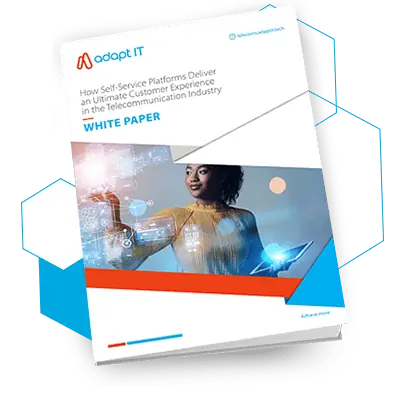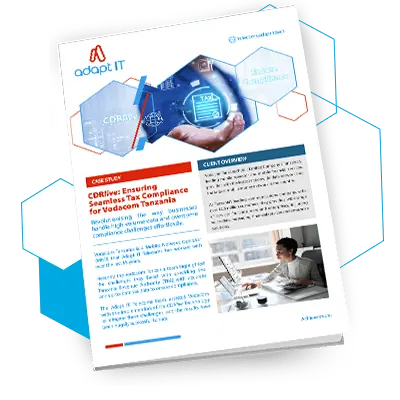Table of Contents
ToggleRich Communication Services are set to dominate the future of messaging and for a good reason. This messaging protocol opens up a world of opportunity, especially for Telcos, to add value to their customer base, enhance customer experience and monetise their assets. To take full advantage of the opportunities that Rich Communication Services provide, Telcos need to ensure that they have the right technology in place. This technology will allow for the seamless integration of third-party Rich Communication Services and applications to integrate into the complex Telco networks. The answer to this is Adapt IT’s NextGen v.Services solution.
What are Rich Communication Services (RCS)?
Rich Communication Services, also known as RCS, is a protocol between mobile operators and phones. This technology allows Mobile Network Operators to expand their services and offerings far beyond what is capable with SMS and MMS. It will enable feature rich messaging that goes beyond text messages. This includes the exchange of group chats, video, audio, high-resolution images, read receipts, real-time viewing, and has the chat capabilities of other rich messaging apps like Apple’s iMessage, WhatsApp, Facebook Messenger, and more.
RCS was first developed in 2007 and in 2008 it was taken over by the GSM Association (GSMA), which is the industry trade body that represents mobile operations. This technology took some time to get off the ground. In 2016, the GMSA agreed on a Universal Profile or global RCS network, which is a set of standards that all mobile operators, carrier networks, smartphone manufacturers, and software providers can use to help implement RCS on devices.
Rich Communication Services allows for the sending and receiving of verified messages that can carry information, like photos, videos, and audio messages. RCS are usually provided to the mobile network operators by third party providers, or Wireless Application Service Providers (WASPs), who deliver RCS services and content independent of mobile operations.

Third-party RCS provides mobile operators with a way to add value to their customer base by providing services that enhance customer experience and ultimately boost revenue. The telecommunications industry is not the only industry utilising RCS, other sectors are also able to utilise RSC. For example, airlines will be able to utilise RCS messaging to send through boarding passes, logistics companies will be able to package delivery notifications, and financial institutions will be able to send out credit card fraud alerts.
You may be asking how big is the RCS market? The answer may surprise you. After being slow to get off the ground, the RCS market size is estimated to grow from USD 5.2 billion in 2020 to USD 11.7 billion by 2025, at a CAGR of 17.6% during 2020–2025. According to GSMA, RCS is supported by over 90 carrier networks, which include AT&T, Verizon, Deutsche Telekom, Orange, Vodafone, and more. There are also 473 million active monthly RCS users globally.
With such a significant estimated market growth, it is essential to unpack why this technology is so valuable.

The Value of RCS
The value of Rich Communication Services lies in its features and how these can be utilised to enhance customer service, user experience, and profitability. These include:
- Added branding and business verification – RCS allow you to enhance your brandability with the inclusion of custom colours, logos and icons on rich communication services and messaging. You are also able to verify business addresses and senders, which enhances security.
- Improved user customer service and experience – with RCS, you can add action buttons, quick button replies, embedded rich cards, location sharing, map integrations, calendar, scheduling, and invoicing and payment integrations. This enhances value and provides customers with more services that improve their overall user experience.
- Making messaging more conversational and personal – this technology allows for multi-device messaging, voice, and video sharing, enhancing the messages and making them interactive. You can also create read receipts, typing indicators, 1-to-1 and group chat administration, QR Codes, Voice to text audio messaging and digital assistant integrations. Each of which is more engaging and can be personalised depending on the user and their needs.
- Shared Documents and Information: RCS allows you to share documents and information in the form of file transfers. It also provides for verified sending.

The above features result in several different benefits for both the Telco and the end-user. These benefits include:
- Reaching people who are most likely to take the action you want them to take.
- Improving the customer experience with real-time order confirmations, product announcements, and information.
- Keep customers engaged with interactive messaging.
- Personalising messaging to better connect with customers.
- Enhancing brand awareness through added branding capabilities.
- Providing users and customers with more value added services to boost revenue
- Monetising network assets to enhance profitability and differentiation in the market.
Revenue driving opportunities for MNO and MVNO using Rich Communication Services
As discussed above, RCS is an IMS-based platform that enables the delivery of communication services beyond traditional voice and SMS platforms. Mobile Network Operators (MNO’s) and Mobile Virtual Network Operators (MVNO’s) are in a unique position to utilise this technology to increase their revenue.
MNO’s and MVNO’s are currently experiencing many different challenges in relation to driving profitability. With so much competition in the market, many Telcos are looking for ways to diversify their offerings and monetise their assets. RCS implementation provides a way in which to do this.

By using RCS, Telcos can provide their consumer base with more value-added services such as USSD, SMSC, bulk messaging, instant messaging, chat, live video, content sharing, file transfer, and IP video calls across devices on any network and more. Telcos are further able to expand on the different Business-to-Business (B2B) opportunities related to advertising, marketing, and promotions to boost revenue.
According to GSMA, RCS Business Messaging provides the opportunity for operators to grow revenue by enhancing their business to offer new capabilities and share in the revenue generated by new business paradigms such as AI, chatbots, and in-chat search.
You may be asking how this is made possible when considering the complexity of Telco networks. The simple answer is that by utilising technology and software like Adapt IT’s NextGen v.Services Telcos can connect with third party providers and integrate their applications into the networks. This allows Telcos to provide their customer base with RCS.
Adapt IT’s NextGen v.Services bridges the gap between the complex Telco networks, their systems, and the capabilities of third party applications. This is primarily because the NextGen v.Services solution is already integrated into most of the network systems that a third party would need to access to provide the customers with the necessary RCS services on offer. In this way, NextGen v.Services is an enabler for Teclos to monetise their assets.

Adapt IT Telecoms NextGen v.Services
The Adapt IT NextGen v.Services solution was designed to help Telcos provide customers with value-added services, like Rich Communication Services, which can be implemented and rolled out to market quickly and efficiently.
The middleware technology utilised in this solution enables multiple channels to leverage off of the NextGen v.Services Framework solution. In simple terms, this technology allows Telcos to utilise multiple Rich Communication channels, including USSD, SMSC, Mobile Apps, WhatsApp Channels, Website portals, and more, from one integrated framework.
The ability to provide the above-mentioned services and applications across multiple channels is often referred to as an Omnichannel. This is where there is one integration channel doing the work for all of the different applications, simplifying the complexity of integrating these applications to the Telco network. This solution is integrated into a number of network systems already, which means that you can add third-party applications like RCS to the network faster and more efficiently.
When examining the value of this solution for Telcos, the opportunities are endless. It is now possible to utilise RCS to create advertising and marketing opportunities to enhance revenue. Telcos are also able to sell advertising and marketing space to businesses and brands. For example, selling the white space on an MMS or the space left at the bottom of a Please Call Me.

Telcos will also be able to enhance customer experience by personalising communication with customers. For example, we are seeing subscribers request certain preferred mediums for communication. The capabilities of this technology allow Telcos to personalise their communication to specific users depending on their preferences. Telcos are further able to upsell products and services by utilising RSC. For example, suppose a user has a 3G enabled mobile but is only using the 2G compatibility services. In that case, you as a Telco can market to these users with 3G related deals, promotions, or specials to get them to try out the faster network and ultimately move the user to the newer network.
Adapt IT’s NextGen v.Services solution provides Telcos with a way to utilise Rich Communication Services to create an integrated and blended customer experience. This solution is also incredibly secure and protects the network from threats, especially where third party application integration is concerned.

Conclusion
For Telcos to take full advantage of Rich Communication Services and their capabilities, they need to ensure they have the framework and software structure to support these services. Adapt IT’s NextGen v.Services solution is the perfect fit for this. It integrates into the network systems effortlessly and seamlessly, allowing Telcos to effectively monetise their assets by plugging in and providing third-party Rich Communication Services to their customer base efficiently and effectively. Rich Communication Services are set to gain significant traction over the next five years, and the implementation of 5G will further enhance the use of this technology globally. For more on our NextGen v.Service solution and how you can use it to implement RCS visit https://telecoms.adaptit.tech/solutions/nextgen-v-services/

Add Value To Your End Users
Explore the intricate details of NextGen v.Services and how It provides a future-proofed, cloud-ready solution that can adapt to digital transformation trends and facilitates fast and convenient implementation of new services.

Steven Sutherland experienced Adapt IT Divisional Executive, dynamic business leader for their Telecoms Division with a demonstrated 25-year history in the telecommunications and IoT sectors. Strong global marketing, sales, and business development professional with 15 plus years focused experience in the Southern and Rest-of-Africa markets and a unique blend of entrepreneurial spirit combined with a passion for both technology and business.
At Adapt IT Steven is responsible for building and growing the Telecoms Division on top of its industry-proven software competencies including but not limited to Customer Experience and Self Service, NextGen VAS, IoT, FINTECH, and Advanced Analytics. Steven is always looking forward to an opportunity to demonstrate the value that his 20 plus years of experience in these disciplines can bring to your business




